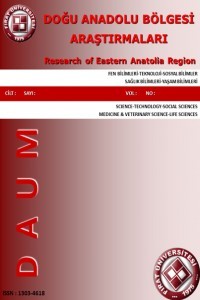SUBKONDRAL DEFEKTLERDE OTOJEN SPONGİYÖZ KEMİK GREFTİ VE KORAL İMPLANT UYGULAMALARININ KARŞILAŞTIRILMASI: KÖPEK DİZ EKLEMİNDE DENEYSEL ÇALIŞMA
Subkondral Defekt, Otojen Spongiyöz Kemik Grefti, Koral İmplant, Köpek
___
- 1. Begley, C.T., Doherty, M.J., Mollan, R.A. and Wilson, D.J. 1995. Comparative Study of the Osteoinductive Properties of Bioceramic, Coral and Processed Bone Graft Substitutes. Biomate-rials, 16(15): 1181-1185.
- 2. Desjardins, MR., Hurtig, MB. and Palmer, NC. 1991a. Heterotopic transfer of fresh and cryopreserved autogenous articular cartilage in the horse. Vet. Surg., 20(6): 434-445.
- 3. Desjardins, MR., Hurtig, MB. and Palmer, NC. 1991b. Incorporation of fresh and cryopreserved bone in osteochondral autografts in the horse. Vet. Surg., 20, (6): 446-452.
- 4. Dew, TL. and Martin, RA. 1992. Functional, radiographic, and histologic assessment of healing of autogenous osteochondral grafts and full-thickness cartilage defects in the talus of dogs. Am. J. Vet. Res., 53(11): 2141-2152.
- 5. Dew, TL. and Martin, RA. 1991. The functional, radiographic and histologic comparison of an autogenous orthotopic osteochondral graft and a full-thickness cartilage defect in the canine talus. Vet. Surg., 20(5): 334.
- 6. Durmuş A.S. ve Ünsaldı, E. 2001. Köpeklerde Deneysel Maddi Kayıplı Femur Kırıklarında Ko-ral ve Spongiyöz Otogref Uygulamalarının Kar-şılaştırması. F.Ü. Sağlık Bilimleri Dergisi, 15(1): 101-112.
- 7. Fallon, K.R. 1990. Osteochondritis Dissecans of the Stiffle. In: Current Techniques in Small Animal Surgery. Ed: Bojrab, M.J. Third Ed. Lea & Febiger, Philadelphia, 721-722.
- 8. Guillemin, G., Meunier, A., Dallant, P., Christel, P., Pouliquen, J.C., Sedel, L. 1989. Comparison of coral resorbtion and bone apposition with two natural corals of different porosities. J. Biome-dical Mat. Res., 23:765-779.
- 9. Imhoff, A.B., Ottl, G.M., Burkart, A. and Traub, S. 1999. Osteochondral autologous transplanta-tion in various joints. Orthopade, 28(1): 33-44.
- 10. Luna L.G. 1968. Manual of Histologic Staining Methods of the Armed Forces Institute of Patho-logy. Third Ed. Mc. Graw. Will Book Comp. London.
- 11. McIlwraith, CW., Howard, RD., Trotter, GW., Powers, BE., McFadden, PR, Harwood, FL. and Amiel, D. 1994. Sternal cartilage autografts for repair of large osteochondral defects in horses: long-term fate and effects of exercise. Veterinary and Comparative Orthopaedics and Traumato-logy, 7(1): 63-64.
- 12. Oka, Y. and Ikeda, M. 2001. Treatment of Seve-re Osteochondritis Dissecans of the Elbow Using Osteochondral Grafts from a Rib. J. Bone Joint Surg. B., 83(5): 738-739.
- 13. Penwick, R.C., Moiser, D.A. and Clark, D.M. 1991. Healing of Canine Autogenous Cancellous Bone Graft Donor Sites. Vet. Surg., 20(4): 229-234.
- 14. Piermattei, D.L. and Greeley, R.G. 1979. An At-las of Surgical Approaches to the Bones of the Dog and Cat. WB Saunders Company, Philadelphia, XII + 202.
- 15. Pouliguen, J.C., Noat, M., Guillemin, G. and Pa-tat, J.L. 1990. Coral as a Substitute for Bone in Pediatric Orthopedics. Ann. Pediat., 37(1): 59-61.
- 16. Ripamonti, U. 1996. Osteoinduction in Porous Hydroxyapatite İmplanted in Heterotopic Sites of Different Animal Models. Biomaterials, 17(1): 31-35.
- 17. Scranton, P.E.Jr. and McDermott, J.E. 2001. Treatment of type V Osteochondral Lesions of the Talus with Ipsilateral Knee Osteochondral Autografts. Foot and Ankle International, 22(5): 380-384.
- 18. Shahgaldi, B.F. 1998. Coral Graft Restoration of Osteochondral Defects. Biomaterials, 19: 205-213.
- 19. Siebert, C.H., Miltner, O., Schneider, U., Wah-ner, T., Koch, S. and Niedhart, C. 2001. Healing of Osteochondral Grafts. An animal study. Zeitschrift fur Orthopadie und Ihre Grenzge-biete, 139(5): 382-386.
- 20. Walter, M.C., Lenehan, T.M., Smith, G.K., Matthiesen, D.T. and Newton, C.D. 1986. Treatment of Severely Communited Diaphyseal Fractures in the Dog, Using Standart Bone Plates and Autogenous Cancellous Bone Graft to Span Fracture Gaps: 11 Cases (1979-1983). JAVMA, 189(4): 457-462.
- 21. Welch, R.D., Berry, B.H., Crawford, K., Zhang, H., Zobitz, M., Bronson, D. and Krishnan, S. 2002. Subchondral defects in caprine femora augmented with in situ setting hydroxyapatite cement, polymethylmethacrylate, or autogenous bone graft: biomechanical and histomorpho-logical analysis after two-years. Journal of Orthopaedic Research, 20: 464–472.
- 22. Yaylaoğlu, M.B., Yıldız, C., Korkusuz, F., Ha-sırcı, V. 1999. A novel osteochondral implant. Biomaterials, 20:1513-1520.
- ISSN: 1303-4618
- Başlangıç: 2002
- Yayıncı: Fırat Üniversitesi
İSTATİSTİKSEL PROSES KONTROL TEKNİKLERİNİN ZİNCİR İMALATI YAPAN BİR İŞLETMEDE UYGULANMASI
‘KABADAYI’ GERÇEKTEN TÜRKİYELİ Mİ?
KİLLİ BİR ZEMİNİN TUNÇBİLEK UÇUCU KÜLÜ KULLANILARAK STABİLİZASYONU
Hüseyin Suha AKSOY, Mehmet YILMAZ, Engür Esen AKARSU
KAYA ŞEVLERİN STABİLİTE ANALİZİ
AFGANİSTAN EĞİTİM SİSTEMİNİN İNCELENMESİ
İbrahim Yaşar KAZU, Sadik GÜLECEN
Huriye TEKİN ÖNÜR, Engin GÜNEŞ
FUTBOLCULARLA GÜREŞÇİLERİN SALDIRGANLIK DÜZEYLERİNİN KARŞILAŞTIRILMASI
Yakup Akif AFYON, Hüseyin ÖZKAN
ELAZIĞ İL MERKEZİNDE HAVA KİRLİLİĞİ
Ali Said DURMUŞ, Hatice ERÖKSÜZ
LOKAL OTOJEN OSTEOKONDRAL GREFT UYGULAMALARI: KÖPEKLERDE DİZ EKLEMİNDE DENEYSEL ÇALIŞMA
